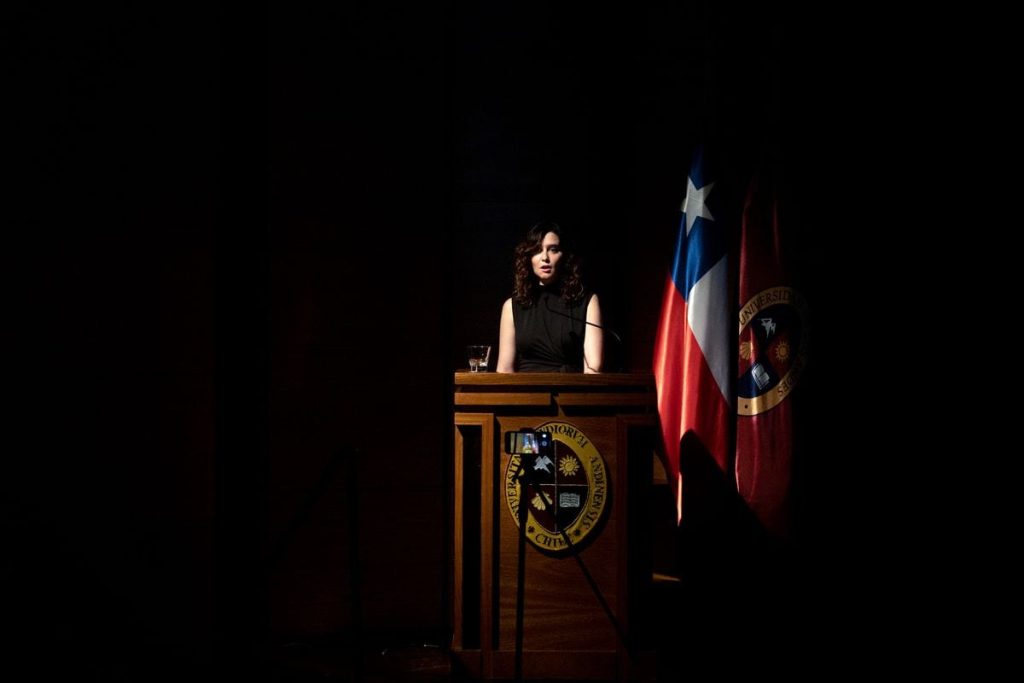The four-day visit of the President of the Community of Madrid, Isabel Díaz Ayuso, to Santiago de Chile passed relatively unnoticed. While in Spain, news broke of the judicial investigation into her partner, Alberto González Amador, for alleged tax fraud and falsification of documents through the company Maxwell Cremona. Despite this controversy, Ayuso met with Chilean business leaders and students to promote Madrid as a hub for investment. She did not hold any meetings with political authorities, despite efforts by the traditional right-wing coalition Chile Vamos to arrange one. Ayuso’s team argued that the trip was institutional rather than political, although she used most of her appearances to criticize the government of the socialist Pedro Sánchez.
During her visit, Ayuso engaged with representatives of influential Chilean business groups such as the Society of Industrial Development (Sofofa) and the Production and Commerce Confederation (CPC), but no formal agreements were signed. Her team described the trips as opportunities to sow seeds for future partnerships. Ayuso only answered questions from the press once during the visit, during which no local media were present, and granted interviews to two conservative-leaning newspapers, El Mercurio and El Líbero. In these interviews, she continued her criticism of the Spanish government, alleging institutional decay and attempts to undermine the constitutional order. She also suggested that tensions benefit anti-liberal groups, referencing the 2019 social unrest in Chile as an example of this dynamic.
Ayuso’s only interaction with a Chilean political figure during her visit was a meeting with Senator Ximena Rincón, a former member of the Christian Democratic Party and now a part of the Demócratas party, closer to the right. In contrast, during a previous institutional trip to New York and Washington, Ayuso had met with US authorities, albeit with limited attendance. Her visit to Chile focused on promoting educational exchanges, highlighting Madrid as a city of freedom and opportunities for young people. Ayuso emphasized the decentralized nature of Spain, allowing regions like Madrid to implement their fiscal policies and initiatives different from the national government.
Invest in Madrid, the agency responsible for identifying potential investment opportunities for the Community of Madrid, recommended Ayuso’s visit to Chile as the first stop on her Latin American institutional tours. Her visit coincided with President Pedro Sánchez’s trip to Chile, where they emphasized their progressive alignment. Ayuso’s trip included meetings with business leaders from various sectors and a session with students at the University of the Andes, a private institution associated with the Opus Dei. She highlighted the strengths of the Madrid university system during this final meeting, underscoring the educational opportunities available in the Spanish capital.
When asked by EL PAÍS about her partner’s legal troubles, Ayuso declined to comment, citing the ongoing judicial process. She reiterated her belief that the truth would come to light in due course. Ayuso’s visit to Chile aimed to foster economic and educational ties between Madrid and Chile, showcasing the Spanish capital as an attractive destination for investment and student exchange. Despite the controversy surrounding her partner, Ayuso focused on promoting Madrid’s opportunities and strengths, highlighting the benefits of a decentralized governance system for regions like Madrid. The trip, while not leading to immediate agreements, set the stage for potential future collaborations between Chile and Madrid in various sectors.


